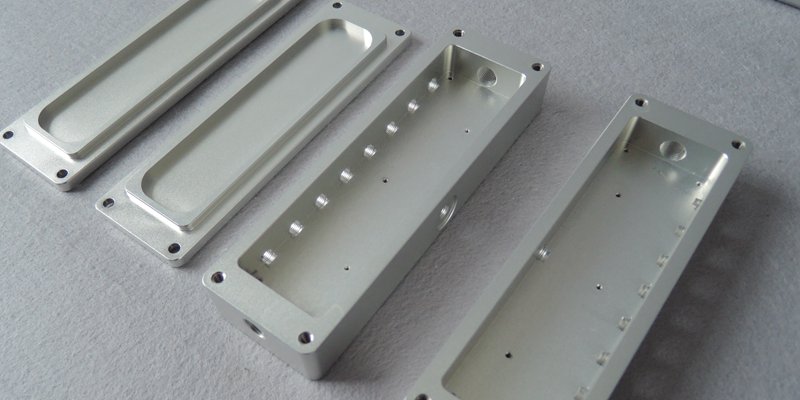- October 6, 2023
Machined enclosures are essential components in various products, performing different purposes. These enclosures are mandatory in electrical devices, irrespective of size and complexity. These enclosures ensure resistance to harsh industrial environments and prevent electrical hazards.
This article discusses the use of custom enclosures and the different methods and materials for manufacturing enclosures. You’ll also learn the design tips and other applications of machined enclosures.
What Custom Enclosures Use for?
Custom enclosures have varying uses in different industries. They protect and house electronic components, electrical equipment, or devices in various applications. Manufacturers often utilize custom electronics cases in consumer electronics, medical devices, automotive electronics, industrial control systems, etc. These custom machined enclosures protect these devices from environmental, electromagnetic, and radio frequency interference.
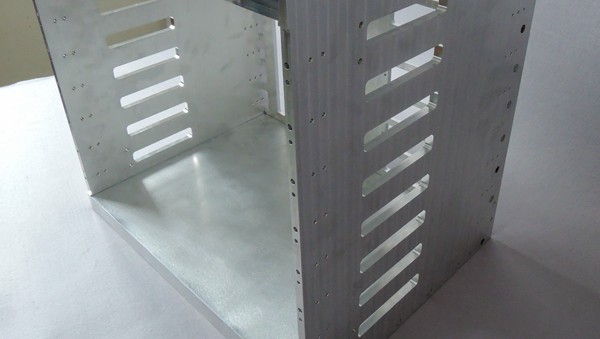
Manufacturers commonly use machined enclosures to enhance the physical appeal of products, ensuring they fit the intended purposes. Moreover, these enclosures aid optimal customization, allowing designers to meet specific product design requirements and dimensions facilitating efficient component assembly.
In addition, custom enclosures are ideal for protecting electronic components and devices, ensuring safety. They also prevent contaminants such as chemicals, dirt, moisture, and physical hazards, mitigating the risk of electric shock.
Different Methods for Custom Enclosure Manufacturing
Product engineers and designers adopt custom enclosure manufacturing methods that meet specific requirements. However, the ideal method is determined by design complexity, materials used, budget considerations, and the quantities of prototype to production.
Below are typical methods used in making custom enclosures:
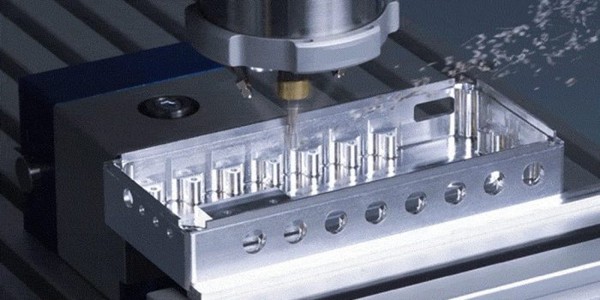
CNC Machining
CNC machining processes use automated machines to produce custom metal enclosures with varying shapes and sizes. These processes are well-suited for making prototypes and low-volume enclosures with tighter tolerances and high accuracy.
Sheet Metal Fabrication
Sheet metal fabrication is a widely embraced custom-machined enclosure. It involves bending or forming metals using specialized machines to produce custom electrical enclosures with preferred shapes. It is suitable for making durable enclosures with precise dimensions. This technique is usually cheaper than enclosures CNC machining. Typical sheet metals used in fabricating machined enclosures include carbon steel, stainless steel, and aluminum.
3D Printing
3D printing or additive manufacturing process creates a custom electronics box by building one layer above the other. This method is suitable for creating test prototypes, custom designs, and small amounts of enclosures with complex geometries.
This additive manufacturing technique offers greater speed and design freedom than most methods. Additionally, 3D printing allows the creation of custom enclosures with intricate details.
Vacuum or Urethane Casting
Vacuum casting is an effective custom enclosure manufacturing method that is quicker and more affordable than injection molding. This technique can produce low-volume enclosures easily. It is perfect for making medical devices and full-size robot enclosures.
Metal Materials Used in Custom Enclosures
There are different materials that are compatible with custom enclosures for various applications as long as you understand the requirements of your products. The best metals for enclosures are usually wear and corrosion-resistant due to exposure to specific working conditions. This section discusses the different metal materials suitable for custom enclosures.
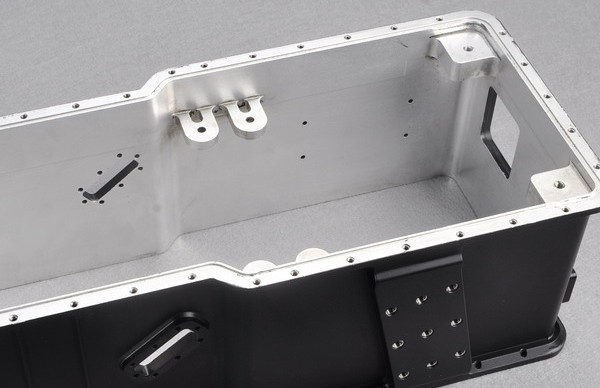
Aluminum
Aluminum is a lightweight and corrosion-resistant metal with significantly low stiffness levels in certain conditions compared to steel. Although aluminum has varying grades, the 5052 and 6061 aluminum are the primary aluminum alloys commonly used in custom enclosures.
Moreover, these aluminum alloys are perfect for custom aluminum enclosures due to their corrosion-resistant and lightweight properties. However, you may need to anodize aluminum parts to enhance their durability and physical properties with protective coatings. More so, chromate coating is an ideal alternative for parts that require electrical contact.
Stainless Steel
Stainless steel comprises nickel and chromium, which guarantees increased resistance to corrosion. Additionally, stainless steel provides greater tensile strength than aluminum. Hence, this material is ideal for custom enclosure design for applications with high-impact requirements. Besides, stainless steel components offer a grained finish.
Galvanneal Steel
This metal is a low-carbon steel with zinc coating and annealed. The annealing process ensures the zinc adhesion through diffusion into the substrate. As such, the zinc coating will not flake off during bending or forming. Therefore, Galvanneal is ideal for machined enclosures if your products need to function in wet conditions. More importantly, Galvanneal is also resistant to corrosion depending on its coating.
CRCA
Rolled close annealed steel material is perfect for indoor enclosures and parts. CRCA provides an ideal combination of strength and stiffness for machined enclosures. As such, indoor applications ensure their longest-term durability. However, CRCA lacks inherent corrosion resistance, it may rust if left uncoated.
Advantages of Custom Machined Enclosures
Custom machined enclosures are ideal for various applications due to their vast benefits. Below are some of the common advantages of custom-machined enclosures.
Design Flexibility
Product designers can tailor custom-machined enclosures to meet the housed components’ required dimensions, shapes, and demands. As such, the permitted customization level of custom machined enclosures facilitates efficient use of space and ideal integration of parts.
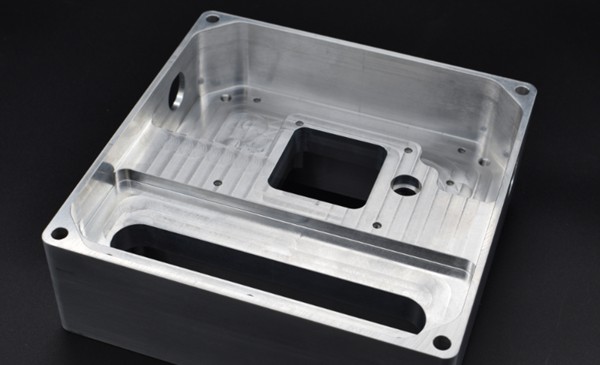
Precision and Accuracy
You can achieve high precision and accuracy in machining custom enclosures for various purposes. These enclosures are machined to the specifications of the housed components, allowing the internal components to be adequately held and protected.
Material Versatility
Custom metal enclosures are compatible with various metals, including plastic, aluminum, and stainless steel, with properties like electrical insulation, corrosion resistance, and thermal conductivity. Therefore, considering aesthetics, weight, durability, and conductivity, you can choose the ideal material for your custom-machined enclosures.
Durability and Strength
Machined enclosures are usually solid and durable. As such, they are perfect for applications that require protection against wear and tear, physical impact, and harsh environments.
High-Quality Finish
Machining can create custom enclosures with shiny surfaces and professional finishes. More importantly, you can customize the surface finishes for machined enclosures for an aesthetically appealing appearance.
Better Heat Dissipation
Custom enclosures are ideal for housing components that emit heat. To improve heat dissipation, you can design various features including additional vents, heatsinks, and thermal management solutions.
Design and Practice Tips for Custom Electronics Enclosures
Designing and machining custom enclosures for electronics comprises various steps to ensure overall quality, aesthetics, protection, and functionality. Below are crucial design and practice tips for fabricating custom enclosures for electronics.
Purpose and Working Environment
Determining the purpose and requirements of the enclosure is fundamental to its design. It is best to decide whether or not it is for indoor or outdoor use, protection from water or dust, or resistance to impact. Specify the dimensions of the electronics that the enclosure needs to cover. Most especially, identify the required displays, buttons, ports, and ventilation openings.
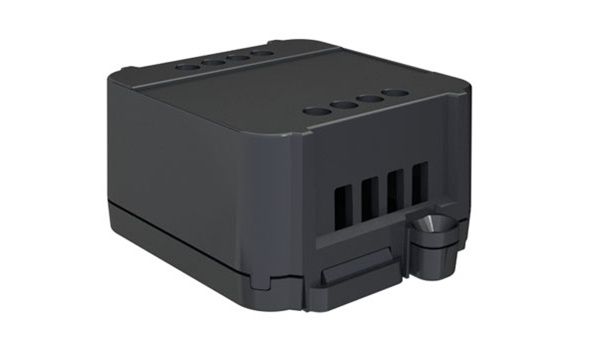
Material Choice
Pick a suitable material such as metal, plastic, or a combination of materials for the custom electronic case. It would help to consider the intended material’s thermal conductivity, mechanical properties, and electromagnetic interference (EMI) shielding capabilities.
Design Software
It is advisable to utilize CAD (computer-aided design) software such as Fusion 360, SolidWorks, or AutoCAD to produce 3D models for the custom machined enclosure.
Enclosure Layout
Ensure the proper fitting and alignment of the electronic components by carefully placing the components and retaining sufficient space for connectors, wiring, and airflow within the device.
More importantly, it would be best to strategically add openings for switches, displays, ports, and indicators without compromising the enclosure’s integrity.
Ventilation and Cooling
Design fans or strategic ventilation openings to mitigate overheating of electronic components. However, ensure the ventilation continuously protects the component from dust or water.
Applications of Custom Enclosures
Custom machined enclosures are perfect for the different industries of electronics applications. These components often require organization, protection, and customization.
Medical Devices
Custom enclosures are ideal for housing diagnostic devices, medical equipment, and instruments. They ensure safety, sanitation, and compliance with medical regulations.
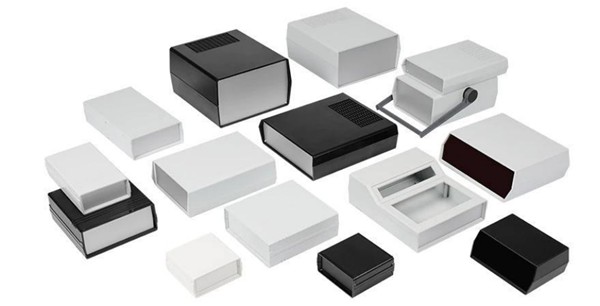
Telecommunications
Engineers often use enclosures for housing networking equipment, switches, routers, and communication parts. These enclosures aid organized cable management and protection.
Automotive Electronics
Manufacturers in the automotive sector utilize custom enclosures to protect electronic components like infotainment systems, control modules, and sensors from vibrations, temperature variations, and harsh environments.
Aerospace and Aviation
Custom machined enclosures are well suited for protecting aircraft components such as flight control electronics, avionic flights, navigation equipment, and communication devices to ensure safe operation in harsh conditions.
Outdoor Equipment
The custom electronics box helps to ensure better weather resistance and durability for outdoor equipment like utility metering systems, lighting controls, and weather stations.
Choosing the Right Custom Machined Enclosure Manufacturer
WayKen offers extensive styles of machined enclosures, housing, and shells that fit your intended applications. Whether you’re in aerospace, automotive, electronics, or any other industry, we have the expertise and resources to provide you with machining solutions.
At WayKen, we use advanced CNC machining technology to ensure a high level of accuracy and consistency in products. We also understand that each project is unique, and take pride in our ability to deliver high-quality and cost-effective custom machined parts to meet your specific needs.
Conclusion
Custom machined enclosures are best used in safeguarding and protecting high-end equipment in various applications. As such, product designers and manufacturers utilize these enclosures as the best solution for preserving equipment from rust, moisture, electric shock, and injuries in electronic devices.
FAQs
What is an enclosure in electronics?
Custom electrical enclosures are box-like structures designed to enclose and protect electronic components like integrated circuits, printed circuit boards (PCBs), processors, switch relays, etc.
Which aluminum is best for a machined enclosure?
6061 aluminum is the perfect aluminum alloy for making a custom machined enclosure for multiple applications. You can easily mill it into the desired shape due to its remarkable material properties, including thermal conductivity, excellent strength, and machinability.
What is the best way to design an enclosure?
The ideal way to make custom enclosures that fit the intended purpose is to define your product’s requirements clearly. It would be best to design the machined enclosures around the component and identify the ideal balance between product aesthetics, accessibility, and functionality.

